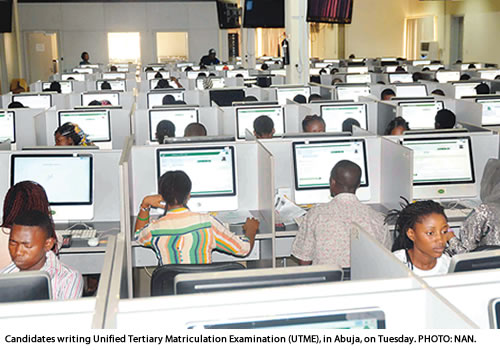The Federal Government finally affirmed the supremacy of the Joint Admissions and Matriculation Board (JAMB)- conducted Unified Tertiary Matriculation Examination (UTME) by scrapping the Post-UMTE test usually conducted by tertiary institutions.
The decision announced by the Minister of Education, Mallam Adamu Adamu at the June 2 meeting called by JAMB to fix cut-off points for UTME, explained that the examination body has done a lot and now has the credibility that implies that the result from its entrance examination should be acceptable to all. This development is a confirmation that JAMB’s Registrar, Professor Dibu Ojerinde, got it right all along.
Confidence in the examination body was finally restored with the level of fidelity assured by the Computer Based Test (CBT) introduced by the board. As opposed to the era of Pencil and Paper Test (PPT), when candidates were able to cheat, CBT has ruled out incidents of examination fraud. The quality of the examination now conducted by JAMB is such that some of the institutions’ heads were already aligned with scrapping the Post-UMTE because it was an unnecessary duplication and exploitative of candidates who had already paid substantial amount to sit the unified examination. Professor Ojerinde and the management team at JAMB must, however, not be lulled by the institution’s series of success into thinking that those who benefit under the previous arrangement would not put up some form of resistance. With more than one million candidates seeking tertiary institution admissions each year, the Post-UMTE test was an over N2billion annual business since intending students pay N2,000 each on the average. The tricks up the sleeves of those who want to continue earning this illegal revenue are many — they will resort to mudslinging and blackmail as well as try to repackage their extortion under new names and processes like UMTE result verification fee.
Since JAMB has the full backing of its parent ministry and has the mandate over admissions into tertiary institutions, Professor Ojerinde must follow up by monitoring compliance with the scrap of Post-UMTE test and ensure the extortion is not reintroduced under a new name. The Minister of Education, Mallam Adamu, must, on his part, give the necessary backing to JAMB as the issue of using the now outlawed test had been a controversial one.
Parents and guardians, in addition to the candidates themselves, have roles to play too. They must appreciate the efforts that JAMB has made in their interest – many promising youths had died in road accidents in the course of traveling to write the needless test. These stakeholders must, therefore, be willing to report any school that secretly tries to conduct any kind of test for the purposes of admission.
Also of concern are vice-chancellors, rectors, provost, registrars. They attended the June 2 meeting and were reported to have endorsed the decision on the understanding and recognition of the progress that JAMB has made so far. They must, therefore, resist the admission syndicates in their various institutions that are likely to attempt finding new ways of fleecing prospective students. Their consenting to the end of Post-UMTE is an endorsement of CBT, which is clearly the way to go.
Their endorsement of CBT did now, however, come as a surprise, given the magnitude of efforts that the board has made in response to the teething problems encountered when it held the first all-CBT examination. Agreed, some of the hitches were blown out of proportion, ostensibly to further the interest of owners of ‘miracle’ examination centres, whose lazy clients can no longer cheat. There were, however, genuine glitches that should not reoccur in the next examination going by the assurances given by JAMB and the actions it has taken to date since the last examination.
At a time when the nation is hungry for reforms that work, JAMB has proven itself to be a benchmark that other agencies, including those outside of the education sector can emulate to deliver on the expectations of Nigerians.
Its proactive approach, like the sensitisation of 500 secondary school students on CBT is a model that government organisations seeking stakeholders’ adoption of their policy can use as it will help to identify potential problem areas and proffer solutions.
Those who think JAMB was archaic and no longer relevant must have changed their perception by now. The Joint Admission and Matriculation Board remains the leveler that ensures our best brains do not lose out on tertiary institution placement because they are not children of moneybags.
Isaac is a public affairs analyst.
WATCH TOP VIDEOS FROM NIGERIAN TRIBUNE TV
- Let’s Talk About SELF-AWARENESS
- Is Your Confidence Mistaken for Pride? Let’s talk about it
- Is Etiquette About Perfection…Or Just Not Being Rude?
- Top Psychologist Reveal 3 Signs You’re Struggling With Imposter Syndrome
- Do You Pick Up Work-Related Calls at Midnight or Never? Let’s Talk About Boundaries






